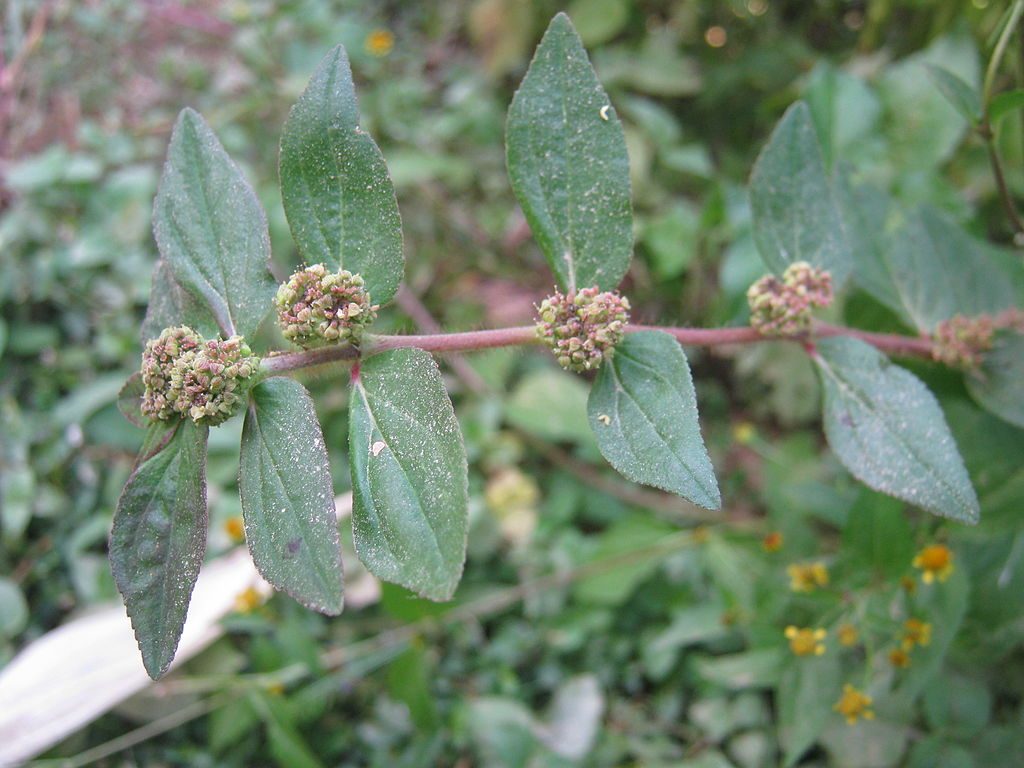 Asthma Weed (Euphorbia hirta) is a small plant that is found in most tropical regions of the World, but which was possibly originally native to Australia. Asthma weed is sometime also called asthma plant. Asthma weed possesses hairy leaves and it can grow upright, or along the ground, reaching a total height or length of about 60 cm. The stem produces a white latex and the plant as a whole contains a number of nutrients that may explain its long history of use in traditional medicine as a treatment for respiratory complaints such as asthma, bronchitis, emphysema and hay fever. It is from here that asthma weed derived its common name. The plant is a rich source of a number of nutrients that may confer beneficial health effects. These include terpenes, polyphenols and alkaloids. While the plant is used traditionally for its respiratory effects, there is a reasonable amount of evidence that it may possess mood enhancing effects. In this regard the asthma weed has been investigated for its anxiolytic effects.
Asthma Weed (Euphorbia hirta) is a small plant that is found in most tropical regions of the World, but which was possibly originally native to Australia. Asthma weed is sometime also called asthma plant. Asthma weed possesses hairy leaves and it can grow upright, or along the ground, reaching a total height or length of about 60 cm. The stem produces a white latex and the plant as a whole contains a number of nutrients that may explain its long history of use in traditional medicine as a treatment for respiratory complaints such as asthma, bronchitis, emphysema and hay fever. It is from here that asthma weed derived its common name. The plant is a rich source of a number of nutrients that may confer beneficial health effects. These include terpenes, polyphenols and alkaloids. While the plant is used traditionally for its respiratory effects, there is a reasonable amount of evidence that it may possess mood enhancing effects. In this regard the asthma weed has been investigated for its anxiolytic effects.

Euphorbia is a group of plants that contains the asthma weed (Euphorbia hirta). These plants are characterised by three main groups of phytochemicals which are terpenes (diterpenes, triterpenes and sesquiterpenes), phenolic derivatives (flavonoids, coumarins, acetophenones, lignans) and some alkaloids. There is some contention as to which of these phytochemicals may confer the mood enhancing effects of the asthma weed and it appears that different types of extract may have slightly different physiological effects. However, all of these groups of phytochemicals have been shown to have some ability to alter the brain chemistry of animals, and as such the terpenes, phenolic derivatives and alkaloids may all be contributing to this effect. Extracts of asthma weed have been shown to activate the benzodiazepine receptor. Interestingly, certain plants from the Euphorbia group have been shown to contain quercitrin (quercetin glycoside), a compound which is known to bind to the benzodiazepine receptor. However, this does not discount the presence of other phytochemicals that could work through other mechanisms. Image: By Krish Dulal (Own work) [CC BY-SA 3.0 (http://creativecommons.org/ licenses/by-sa/3.0)], via Wikimedia Commons.
The anxiolytic properties of the asthma weed have been investigated in animals. For example in one study extracts of asthma weed were administered to mice both through intraperitoneal injection and orally. At high doses the extracts showed sedative properties. However, at lower doses the extracts of asthma weed conferred anxiolytic effects to the mice. The authors of this study noted that no toxic symptoms were observed in the mice. In another study, researchers administered rats extracts of asthma weed and exposed them to stressful conditions. Those rats given the asthma weed extracts exhibited significant reductions in symptoms of anxiety. The authors they investigated the mechanism of action of the asthma weed extracts and found that phytochemicals in the extracts were able to activate the benzodiazepine receptor in the brains of the rats. Therefore asthma weed likely confers anxiolytic effects by working through the same mechanism as the anxiolytic benzodiazepine group of synthetic drugs.
Eat Well, Stay Healthy, Protect Yourself
RdB
